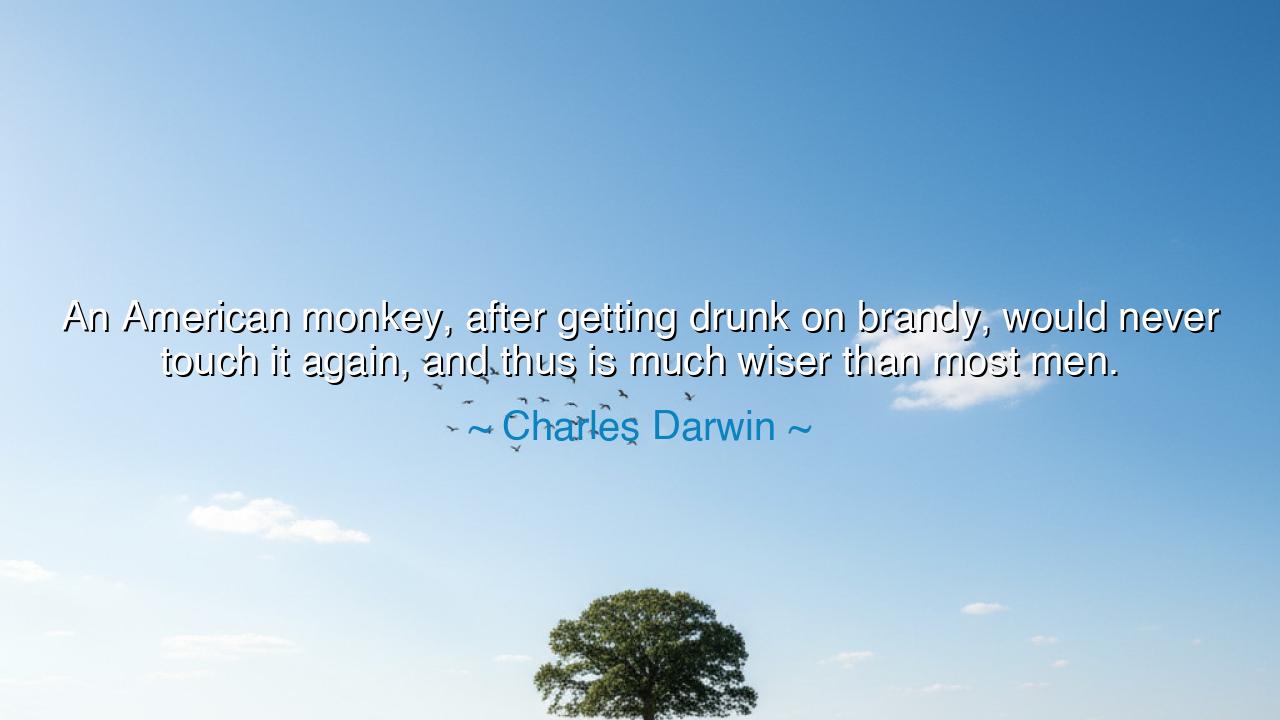
An American monkey, after getting drunk on brandy, would never
An American monkey, after getting drunk on brandy, would never touch it again, and thus is much wiser than most men.






Hear the words of Charles Darwin, the great voyager of thought and life: “An American monkey, after getting drunk on brandy, would never touch it again, and thus is much wiser than most men.” At first glance, this saying may bring a smile, for it dresses wisdom in the garments of humor. Yet beneath its laughter lies a sharp and timeless truth—that even creatures we call “beasts” may show greater discipline than the crown of creation, when folly has seized the human heart.
The monkey, having once tasted the fire of brandy, feels its sting, remembers the pain, and refuses to fall again. This is the way of natural instinct, the wisdom that flows not from books but from the body’s remembrance of harm. Yet man, with his vast intellect, too often lacks this simplicity of wisdom. He tastes the fire, suffers the burn, and then returns again and again, as though enslaved not by ignorance, but by the restless hunger of desire. Darwin, with keen eyes, saw in this a great irony: that the so-called “higher” being often chooses the path of greater foolishness.
This truth is no stranger to history. Recall the tale of Alexander the Great, who conquered nations but could not conquer his own thirst for wine. Many chronicles speak of how, in drunken rage, he slew his dearest friend, Cleitus, and wept bitterly when the wine’s fog lifted from his mind. The monkey, wiser than the king of Macedon, would have touched the cup no more after such sorrow. Yet Alexander, like many men, continued to return to the same vessel of destruction.
The saying also reveals the struggle of humankind with temptation. Unlike the animal, which seeks only survival and balance, man seeks pleasure, even when it destroys him. The monkey flees from what wounds him; man pursues it, often cloaking his folly in excuses: “Just one more,” “Tomorrow I will stop,” “This time will be different.” Darwin, in his sharp jest, unmasks this weakness and shows that wisdom is not measured by intellect, but by the ability to learn from pain and change one’s course.
Yet let us not hear this saying as a condemnation, but as a call to strength. If the animal can be guided by instinct to preserve its life, then surely man, with his gift of reason, can rise above repeated error. The path of wisdom is not to deny that we stumble, but to refuse to stumble in the same place twice. For what is folly if not the refusal to remember? And what is wisdom if not the courage to turn away from the fire that has already burned us?
The lesson, then, is clear: when harm comes from a choice, do not return to that choice. Whether it be the excess of drink, the entanglement of destructive habits, or the repeating of bitter mistakes, learn as the monkey learns. Let the pain be a teacher, not a prison. To persist in folly is to bow lower than the beasts, but to learn and turn away is to rise higher than kings.
Practical action flows like a stream from this truth: examine your life, and take note of the places where you return again and again to what harms you. Resolve, as the monkey resolved, never to touch that poison again. Replace destruction with creation: the cup of excess with the cup of health, the chain of habit with the freedom of discipline. Each time you choose not to repeat the old mistake, you take a step into greater strength, and in this way, you become wiser than the man who conquers nations but cannot govern himself.
Let these words be carved upon your heart: wisdom is not in knowing much, but in living well. The American monkey remembered and was free. Let us, too, remember, so that we may walk not as prisoners of our desires, but as masters of our destiny. For the one who learns from error is greater than the one who repeats triumph yet falls again to the same weakness. This is Darwin’s gift, wrapped in jest yet glowing with eternal fire.






AAdministratorAdministrator
Welcome, honored guests. Please leave a comment, we will respond soon